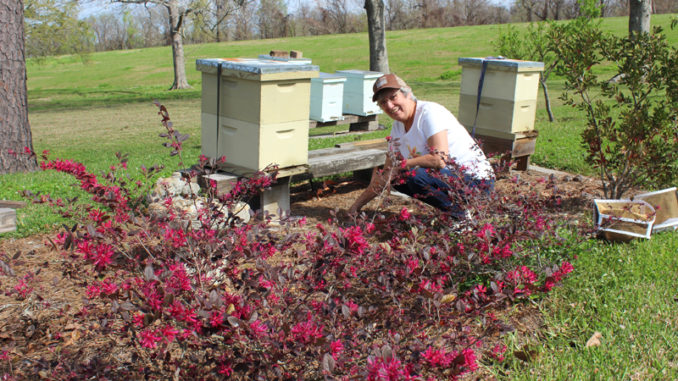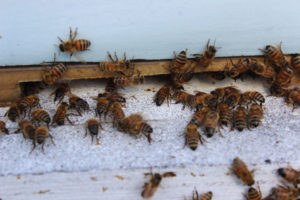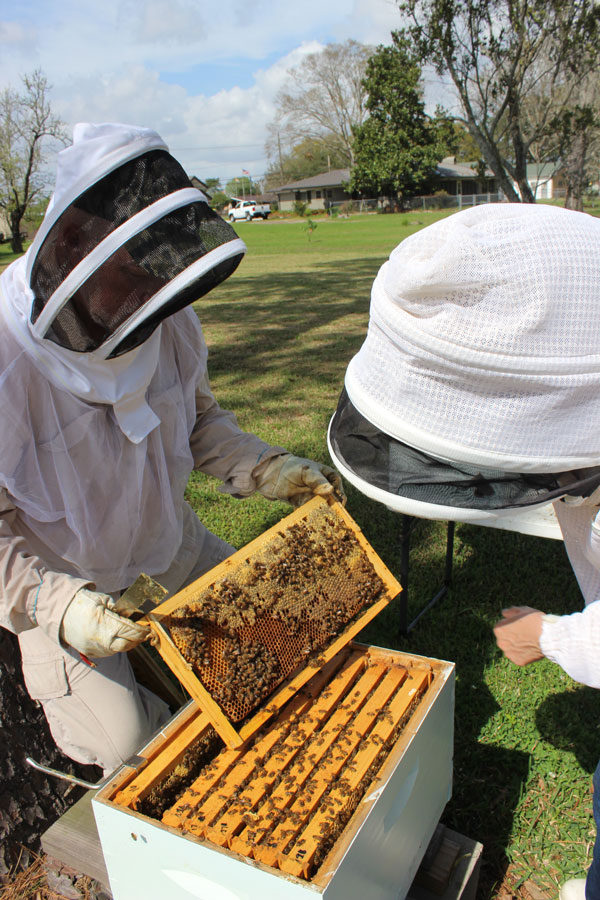
Lifting the lid of Rusty Walker’s hive reveals a world of workaholics who get testy when interrupted from meeting their work schedule and can respond with stinging criticism if things aren’t left in their kind of fastidious order.
But, overall, if left to their work, they’re really sweeties content to buzz from one flower to another gathering the (should be nectar) that becomes that highly sought after stuff called honey.
This is the world of bees and the hobbyists devoted to giving them what they want – a happy workplace.
And for Walker, it’s his apiary or bee yard.
Joan Robbins, who got started beekeeping because vegetable production declined on her family farm from lack of honeybee pollination, and her brother Douglas Zeringue are dedicated to the task.
They are also telling their story about how imperiled the bees are with “the dire situation with failure of bee colonies worldwide,” Robbins said. She has several hives on her family farm, and is teaching Community Education classes with help from Walker and Anthony Zeringue, also a beekeeper in Jefferson Parish.
Walker and Robbins taught together in the parish’s school system and are both retired. About three years ago, Walker decided he wanted to get into beekeeping as long as he had a mentor, and Robbins who is passionate about these little winged workaholics, happily agreed to assist him.
At Walker’s home in Hahnville, the bees are fast at work taking advantage of spring approaching.
It’s a beautiful day with warm, glowing sunshine and a subtle breeze swaying the trees surrounding his hives. Many of them are citrus trees, including grapefruit, blood orange, lemon and mandarin oranges, which Robbins said gives the honey a citrus twist.
“They are a lot like humans; they love the caffeine,” she said. “Citrus blossoms have a lot of caffeine.”
Walker doesn’t notice the taste of citrus in his honey, but he – along with his family – love the stuff. He has it in his coffee every morning, as well as mixes it with garlic and takes it everyday as a home remedy.
Donning their beekeeping headgear and gloves, Robbins and Walker opened some of his hives to prep them for spring honey production.

As they opened the first hive, Robbins scraped off a golden, waxy substance that bees use to glue the materials of their hives together by mixing beeswax and other secretions with resins from the buds of conifer and poplar trees. This orange, sweet smelling stuff is called propolis. Its antibiotic and antiseptic properties have made it a highly sought home and commercial remedy, and friends are asking for it.
“You never know what you’re going to find,” Robbins said. “There is no monotony in beekeeping.”
But the reward for beekeeping is the honey, and last year Walker didn’t make as much of it because the bees were unhappy.
They swarmed a lot, which Robbins explained was due to overcrowding in the hives. They discussed how to split a hive by moving the frames with queen cells into another hive, effectively starting a new colony.
“It is the way bees produce,” she said. “Women have babies; bees swarm.”
In addition to working with Robbins, Walker’s adventure in beekeeping also sent him to YouTube how-to videos. He also got books on beekeeping, but admits he’s still only scratching the surface about it.
Robbins is equally fascinated by bees.
“Watching bees is mesmerizing,” she said. “It’s like relaxing by a campfire – pull up a lawn chair, kick back, and watch them do their thing. There is always something to learn from the bees.”
And for Walker, he said bees have taught him about more than making honey.

“They’re very interesting little creatures,” he said. “When you start studying the nature of a bee it’s so intriguing. They have their responsibilities. If we had a country that got along as the bees do, we’d be great. They’re phenomenal.”




I wish that St. Charles Parish would start a beekeeping club for those who are interested in this hobby.
Contact the county agent, Leslie. Perhaps he could get one started.